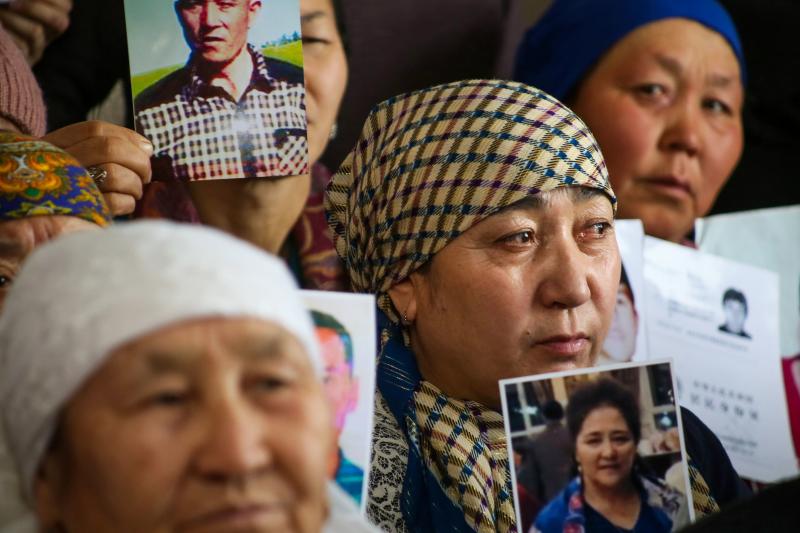China turns Muslim detainees into cheap labour, group claims


As Gulzira Auelkhan stitched gloves in a factory in China's northwestern Xinjiang region, her managers made no secret of where her handiwork would be sold.
"They told us openly that the gloves will be sold abroad, so we should do a good job," Auelkhan recalled of work she said was enforced by Chinese "re-education" officials.
Auelkhan, a 39-year-old Chinese citizen of Kazakh descent, said she was part of a network of mostly Muslim minorities in Xinjiang who were passed from what China called "vocational training centres" to factories where they were forced to work for far less than the local minimum wage.
China said the education centres were part of its efforts to fight terrorism and separatism in Xinjiang - a region populated by mostly Muslim minorities - and denied human rights campaigners' claims of forced labour.
But human rights groups, and former workers such as Auelkhan, said the practice used against Chinese minorities was widespread and at least one foreign company dropped its Chinese supplier over concerns.
Auelkhan said she was transferred to the glove factory at the Jiafang industrial estate in Xinjiang's Yining county after spending 15 months in two re-education facilities.
More than a million people from Muslim minorities - mostly ethnic Uygurs, but also Kazakhs such as Auelkhan, Kyrgyz and Hui - have been held in internment centres across Xinjiang, according to a United Nations panel.

Auelkhan has residency rights in Kazakhstan but had travelled to China to see family when she was detained. She said life in the camps was brutal, with residents struck over the head with electric batons for spending more than two minutes in the toilet.
Although they were not free to leave, there was an improvement when she and hundreds of other inmates were transferred to factory work, said Auelkhan, now back in Kazakhstan.
"Every day, we were taken to and from a dormitory 3km from the factory," she said, hugging the five-year-old daughter she had not seen for nearly two years.
"When we were studying at the camp they told us we would be taught a trade and work for three months."
Auelkhan said she was paid 320 yuan (S$65) for about two months' work before her time at the factory ended in December and she was allowed to return to her family.
Xinjiang's average minimum wage ranges between 820 and 1,460 yuan per month, according to official statistics.
Beijing and officials in the region denied any connection between the camps and cheap labour.
The press office of the Xinjiang Uygur autonomous region government said there was "no labour contract between education and training centres and enterprises" and "no enterprise obtains labour from training centres".
Human rights campaigners groups said the connection was real and some companies had taken notice.
In January, Badger Sportswear, a firm based in North Carolina, said it would stop sourcing clothing from its Xinjiang supplier Hetian Taida over concerns it was using forced labour linked to the re-education campaign.
Auelkhan believed she was released from forced labour thanks to a public campaign launched by her husband and supported by a Xinjiang-focused human rights group in Almaty.
Originally, re-education officials told her and other centre residents that they would be "at [their] disposal" for at least six months, she said.
Oil-rich Kazakhstan's government is a Beijing ally that positions itself as "the buckle" in China's trillion-dollar "Belt and Road Initiative", a strategy for infrastructure and development projects throughout Asia, Europe and Africa.
Kazakh diplomats have entered into a dialogue with Beijing over Xinjiang, without publicly mentioning the re-education centres or criticising China's policies.
In December a representative of Kazakhstan's foreign ministry said during a briefing that China had allowed more than 2,000 ethnic Kazakhs to travel to Kazakhstan as "a kind gesture".
The ministry declined to elaborate on the remarks, which lent hope to many in Kazakhstan that they would be able to bring Xinjiang-based relatives over the border.
For most, this has not happened.
At the Almaty office of the Ata Jurt human rights group dedicated to supporting relatives of the Xinjiang missing, several Kazakhs claimed their relatives swapped "re-education" for other forms of confinement.
One of them, Aibota Janibek, 34, said her sister Kunikei Janibek telephoned her from Xinjiang in January after months without contact to confirm she had been "assigned a job" by the state at a carpet factory in Shawan county.
Aibota Janibek has since lost touch with her sister, but heard from other relatives that she was transferred from the carpet factory to another position.
"A relative told me she is now at a factory that makes paper towels for aeroplanes," Janibek said.